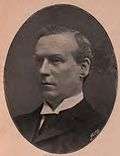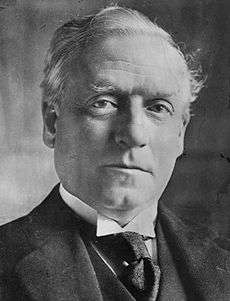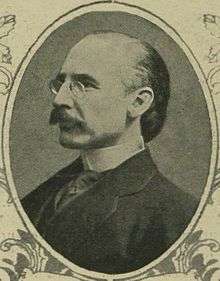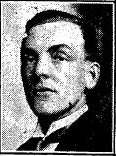East Fife (UK Parliament constituency)
| East Fife | |
|---|---|
|
Former County constituency for the House of Commons | |
| Subdivisions of Scotland | Fife |
| 1885–1983 | |
| Number of members | One |
| Replaced by | North East Fife and Central Fife[1] |
| Created from | Fife and (from 1918) St Andrews Burghs |
East Fife was a county constituency represented in the House of Commons of the Parliament of the United Kingdom from 1885 until 1983. Along with West Fife, it was formed by dividing the old Fife constituency.
It elected one Member of Parliament (MP) using the first-past-the-post voting system, and from 1886 to 1918 it was the seat of the Liberal Prime Minister, H. H. Asquith.
Boundaries
In 1885, the constituency comprised the parishes of Abdie, Abernethy, Anstruther Wester, Anstruther Easter, Auchtermuchty, Balmerino, Cameron, Carnbee, Ceres, Collessie, Crail, Creich, Cults, Cupar, Dairsie, Dunbog, Dunino, Elie, Falkland, Ferry-Port-on-Craig, Flisk, Forgan, Kemback, Kennoway, Kettle, Kilconquhar, Kilmany, Kilrenny, Kingsbarns, Largo, Leuchars, Logie, Monimail, Moonzie, Newburgh, Newburn, Pittenweem, St Andrews, St Leonards, St Monance, Scoonie and Strathmiglo.[2]
In 1918, on the dissolution of the St Andrews Burghs constituency, the burghs of St Andrews, Anstruther Easter, Anstruther Wester, Crail, Cupar, Kilrenny and Pittenweem were added to the constituency. It then consisted of "The Cupar and St. Andrews County Districts, inclusive of all burghs situated therein, together with the burgh of Leven and so much of the Kirkcaldy County District as is contained within the extra-burghal portion of the parish of Scoonie and the parish of Kennoway."
Members of Parliament
Election results
Elections in the 1880s
| Party | Candidate | Votes | % | ± | |
|---|---|---|---|---|---|
| Liberal | John Boyd Kinnear | 4,533 | 63.8 | ||
| Conservative | John Gilmour | 2,577 | 36.2 | ||
| Majority | 1,956 | 27.6 | |||
| Turnout | 7,110 | 77.0 | |||

| Party | Candidate | Votes | % | ± | |
|---|---|---|---|---|---|
| Liberal | Herbert Henry Asquith | 2,863 | 53.5 | ||
| Liberal Unionist | John Boyd Kinnear | 2,489 | 46.5 | ||
| Majority | 374 | 7.0 | |||
| Turnout | 5,353 | 58.0 | -19.0 | ||
| Liberal hold | Swing | ||||
Elections in the 1890s
| Party | Candidate | Votes | % | ± | |
|---|---|---|---|---|---|
| Liberal | Herbert Henry Asquith | 3,743 | 52.0 | ||
| Conservative | John Gilmour | 3,449 | 48.0 | ||
| Majority | 294 | 4.0 | |||
| Turnout | 7,792 | 78.7 | +20.7 | ||
| Liberal hold | Swing | ||||
Herbert Henry Asquith was elected unopposed.
| Party | Candidate | Votes | % | ± | |
|---|---|---|---|---|---|
| Liberal | Rt Hon. Herbert Henry Asquith | 4,332 | 54.5 | +2.5 | |
| Conservative | John Gilmour | 3,616 | 45.5 | -2.5 | |
| Majority | 716 | 9.0 | +5.0 | ||
| Turnout | 7,948 | 84.3 | +5.6 | ||
| Liberal hold | Swing | ||||
Elections in the 1900s
| Party | Candidate | Votes | % | ± | |
|---|---|---|---|---|---|
| Liberal | Rt Hon. Herbert Henry Asquith | 4,141 | 60.4 | +5.9 | |
| Conservative | Arthur Henderson Briggs Constable | 2,710 | 39.6 | -5.9 | |
| Majority | 1,431 | 20.8 | +11.8 | ||
| Turnout | 6,851 | 72.1 | -12.2 | ||
| Liberal hold | Swing | ||||

| Party | Candidate | Votes | % | ± | |
|---|---|---|---|---|---|
| Liberal | Rt Hon. Herbert Henry Asquith | 4,723 | 59.0 | -1.4 | |
| Conservative | John Gilmour | 3,279 | 41.0 | +1.4 | |
| Majority | 1,444 | 18.0 | -2.8 | ||
| Turnout | 8,002 | 80.0 | +7.9 | ||
| Liberal hold | Swing | ||||
Elections in the 1910s
| Party | Candidate | Votes | % | ± | |
|---|---|---|---|---|---|
| Liberal | Herbert Henry Asquith | 5,242 | 62.2 | +3.2 | |
| Conservative | Alexander Sprot | 3,183 | 37.8 | -3.2 | |
| Majority | 2,059 | 24.4 | +6.4 | ||
| Turnout | 8,425 | 81.2 | +1.2 | ||
| Liberal hold | Swing | ||||

| Party | Candidate | Votes | % | ± | |
|---|---|---|---|---|---|
| Liberal | Herbert Henry Asquith | 5,149 | 60.6 | -1.6 | |
| Conservative | Alexander Sprot | 3,350 | 39.4 | +1.6 | |
| Majority | 1,799 | 21.2 | -3.2 | ||
| Turnout | 8,499 | 78.0 | -3.2 | ||
| Liberal hold | Swing | ||||
Herbert Henry Asquith was elected unopposed.

| Party | Candidate | Votes | % | ± | |
|---|---|---|---|---|---|
| Unionist | Alexander Sprot | 8,996 | 54.2 | +14.8 | |
| Liberal | Herbert Henry Asquith | 6,996 | 42.2 | -18.4 | |
| Independent Progressive | W P Morgan | 591 | 3.6 | n/a | |
| Majority | 2,002 | 12.0 | |||
| Turnout | 16,581 | 54.0 | -24.0 | ||
| Unionist gain from Liberal | Swing | ||||
Elections in the 1920s

| Party | Candidate | Votes | % | ± | |
|---|---|---|---|---|---|
| Liberal | James Duncan Millar | 12,697 | 56.0 | +13.8 | |
| Unionist | Alexander Sprot | 9,987 | 44.0 | -10.2 | |
| Majority | 2,710 | 12.0 | 24.0 | ||
| Turnout | 22,684 | 67.2 | +13.2 | ||
| Liberal gain from Unionist | Swing | +12.0 | |||
| Party | Candidate | Votes | % | ± | |
|---|---|---|---|---|---|
| Liberal | James Duncan Millar | 12,825 | 55.5 | -0.5 | |
| Unionist | Alexander Sprot | 10,275 | 44.5 | +0.5 | |
| Majority | 2,550 | 11.0 | -1.0 | ||
| Turnout | 23,100 | 67.8 | +0.6 | ||
| Liberal hold | Swing | -0.5 | |||
| Party | Candidate | Votes | % | ± | |
|---|---|---|---|---|---|
| Unionist | Archibald Douglas Cochrane | 12,664 | 53.0 | +8.5 | |
| Liberal | James Duncan Millar | 11,242 | 47.0 | -8.5 | |
| Majority | 1,422 | 6.0 | |||
| Turnout | 23,906 | 69.2 | +1.4 | ||
| Unionist gain from Liberal | Swing | ||||
| Party | Candidate | Votes | % | ± | |
|---|---|---|---|---|---|
| Liberal | James Duncan Millar | 14,329 | 42.9 | -4.1 | |
| Unionist | Archibald Douglas Cochrane | 13,748 | 41.1 | -11.9 | |
| Labour | W R Garson | 5,350 | 6.0 | n/a | |
| Majority | 581 | 1.8 | |||
| Turnout | 33,427 | 73.3 | +4.1 | ||
| Liberal gain from Unionist | Swing | +3.9 | |||
Elections in the 1930s
- General election of 1931
In the 1931 general election, James Duncan Millar was elected unopposed.

| Party | Candidate | Votes | % | ± | |
|---|---|---|---|---|---|
| Liberal National | James Henderson-Stewart | 15,770 | 52.2 | ||
| Labour | Joseph Westwood | 6,635 | 22.0 | ||
| Agricultural Party | J. L. Anderson | 4,404 | 14.6 | n/a | |
| Independent Liberal | David Edwin Keir | 2,296 | 7.6 | n/a | |
| National (Scotland) | Eric Robert Russell Linklater | 1,083 | 3.6 | n/a | |
| Majority | 9,135 | 30.2 | |||
| Turnout | 30,188 | 65.6 | |||
| Liberal National hold | Swing | ||||
| Party | Candidate | Votes | % | ± | |
|---|---|---|---|---|---|
| Liberal National | James Henderson-Stewart | 27,915 | 82.3 | +30.1 | |
| Labour | Alexander Kerr Davidson | 6,016 | 17.7 | -4.3 | |
| Majority | 21,899 | 64.6 | +34.4 | ||
| Turnout | 33,931 | 71.0 | +5.4 | ||
| Liberal National hold | Swing | ||||
Elections in the 1940s
| Party | Candidate | Votes | % | ± | |
|---|---|---|---|---|---|
| Liberal National | James Henderson-Stewart | 24,765 | 69.4 | -12.9 | |
| Labour Co-op | S P McLaren | 10,920 | 30.6 | +12.9 | |
| Majority | 13,845 | 38.8 | -25.8 | ||
| Turnout | 35,685 | 70.8 | -0.2 | ||
| Liberal National hold | Swing | ||||
Elections in the 1950s
| Party | Candidate | Votes | % | ± | |
|---|---|---|---|---|---|
| National Liberal | James Henderson Stewart | 25,749 | 63.7 | ||
| Labour Co-op | S P McLaren | 10,694 | 26.5 | ||
| Liberal | David Alexander Freeman | 3,975 | 9.8 | ||
| Majority | 15,055 | 37.2 | |||
| Turnout | 81.1 | ||||
| National Liberal hold | Swing | ||||
| Party | Candidate | Votes | % | ± | |
|---|---|---|---|---|---|
| National Liberal | James Henderson Stewart | 28,446 | 70.6 | ||
| Labour | John McGowan | 11,844 | 29.4 | ||
| Majority | 16,602 | 41.2 | |||
| Turnout | 78.7 | ||||
| National Liberal hold | Swing | ||||
| Party | Candidate | Votes | % | ± | |
|---|---|---|---|---|---|
| National Liberal | James Henderson Stewart | 26,104 | 70.6 | ||
| Labour | John McGowan | 10,872 | 29.4 | ||
| Majority | 15,522 | 41.2 | |||
| Turnout | 73.2 | ||||
| National Liberal hold | Swing | ||||
| Party | Candidate | Votes | % | ± | |
|---|---|---|---|---|---|
| National Liberal | Sir James Henderson Stewart | 26,585 | 69.9 | ||
| Labour | John Nicol | 11,421 | 30.0 | ||
| Majority | 15,164 | 39.9 | |||
| Turnout | 75.2 | ||||
| National Liberal hold | Swing | ||||
Elections in the 1960s
| Party | Candidate | Votes | % | ± | |
|---|---|---|---|---|---|
| Unionist | Sir John Edward Gilmour | 15,948 | 47.5 | ||
| Labour | John Smith | 8,882 | 26.4 | −3.6 | |
| Liberal | Donald Frederick Leach | 8,786 | 26.1 | ||
| Majority | 7,066 | 21.1 | |||
| Turnout | 33616 | ||||
| Unionist hold | Swing | ||||
| Party | Candidate | Votes | % | ± | |
|---|---|---|---|---|---|
| Unionist | Sir John Edward Gilmour | 21,001 | 54.2 | +6.7 | |
| Labour | John Smith | 9,765 | 25.2 | −1.2 | |
| Liberal | Derek C Wood | 5,075 | 13.1 | −13.0 | |
| SNP | James Braid | 2,635 | 6.8 | N/A | |
| Independent Loyalist | Miss Leslie M.C. Greene | 257 | 0.7 | N/A | |
| Majority | 11,236 | 29.0 | |||
| Turnout | 38,733 | 77.8 | |||
| Unionist hold | Swing | ||||
| Party | Candidate | Votes | % | ± | |
|---|---|---|---|---|---|
| Conservative | Sir John Edward Gilmour | 19,323 | 51.5 | −2.7 | |
| Labour | Harry Peaker | 9,229 | 24.6 | −0.6 | |
| SNP | James Braid | 5,394 | 14.4 | +7.6 | |
| Liberal | Derek A. Barrie | 3,574 | 9.5 | −3.6 | |
| Majority | 10,094 | 26.9 | −2.1 | ||
| Turnout | 37,520 | 76.1 | −1.7 | ||
| Conservative hold | Swing | ||||
Elections in the 1970s
| Party | Candidate | Votes | % | ± | |
|---|---|---|---|---|---|
| Conservative | Sir John Edward Gilmour | 21,619 | 54.6 | +3.1 | |
| Labour | Henry Ewing | 9,756 | 24.6 | 0.0 | |
| SNP | James Braid | 4,666 | 11.8 | −2.6 | |
| Liberal | Willis R.S. Pickard | 3,577 | 9.0 | −0.5 | |
| Majority | 11,863 | 29.9 | +3.0 | ||
| Turnout | 39,618 | 74.4 | −1.7 | ||
| Conservative hold | Swing | ||||
| Party | Candidate | Votes | % | ± | |
|---|---|---|---|---|---|
| Conservative | Sir John Edward Gilmour | 21,172 | 47.9 | −6.7 | |
| SNP | James Braid | 8,593 | 19.5 | +7.7 | |
| Liberal | Willis R.S. Pickard | 7,766 | 17.6 | +8.6 | |
| Labour | Bashir Maan | 6,634 | 15.0 | −9.6 | |
| Majority | 12,579 | 28.4 | −1.5 | ||
| Turnout | 44,165 | 78.8 | +4.4 | ||
| Conservative hold | Swing | ||||
| Party | Candidate | Votes | % | ± | |
|---|---|---|---|---|---|
| Conservative | Sir John Edward Gilmour | 16,116 | 38.8 | −9.1 | |
| SNP | James Braid | 13,202 | 31.8 | +12.3 | |
| Labour | Helen Lawrie Liddell | 7,040 | 16.9 | +1.9 | |
| Liberal | D.W.C. Docherty | 5,247 | 12.6 | −5.0 | |
| Majority | 2,914 | 7.1 | −21.3 | ||
| Turnout | 41,605 | 73.7 | −5.1 | ||
| Conservative hold | Swing | ||||
| Party | Candidate | Votes | % | ± | |
|---|---|---|---|---|---|
| Conservative | James Stewart Barry Henderson | 20,117 | 43.0 | +4.2 | |
| Liberal | Walter Menzies Campbell | 10,762 | 23.0 | +10.4 | |
| Labour | Henry Baird McLeish | 9,339 | 19.9 | +3.0 | |
| SNP | J. Marshall | 6,612 | 14.1 | −17.7 | |
| Majority | 9,355 | 20.0 | +12.9 | ||
| Turnout | 46,830 | 79.0 | +5.3 | ||
| Conservative hold | Swing | ||||
References
- ↑ "'Fife East', Feb 1974 - May 1983". ElectionWeb Project. Cognitive Computing Limited. Retrieved 22 March 2016.
- ↑ Redistribution of Seats Act 1885
- ↑ Whitaker's Almanack, 1934
- ↑ Whitaker's Almanack, 1939
Sources
- Leigh Rayment's Historical List of MPs – Constituencies beginning with "F"
- Election results, 1950 - 1970
- F. W. S. Craig, British Parliamentary Election Results 1974 - 1983
- F. W. S. Craig, British Parliamentary Election Results 1918 - 1949
- F. W. S. Craig, British Parliamentary Election Results 1885 - 1918
See also
| Parliament of the United Kingdom | ||
|---|---|---|
| Preceded by Worcestershire East |
Constituency represented by the Chancellor of the Exchequer 1905–1908 |
Succeeded by Caernarvon Boroughs |
| Preceded by Stirling Burghs |
Constituency represented by the Prime Minister 1908–1916 |
Succeeded by Caernarvon Boroughs |